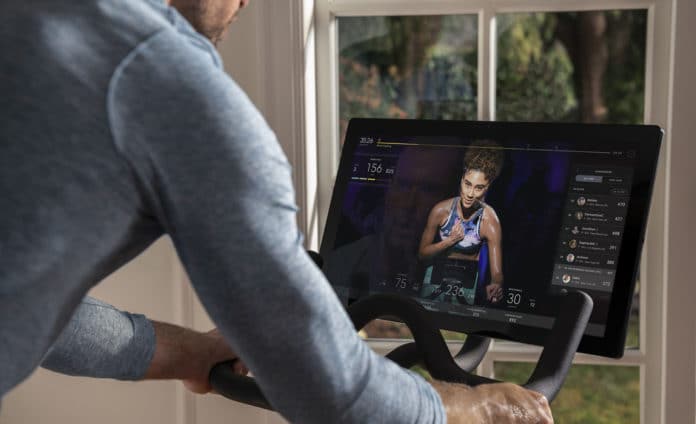It looked like it was going to be an ad for some new Investigation Discovery channel show: The Gift of Murder, The Exercise of Death or Vicious Cycle or some such. It was, I admit, a little creepy the first time I saw it. Social media? It went off its already precarious rocker.
The “it” I’m referring to is a Peloton commercial for the company’s exercise equipment. The company, which already has a cult-like demeanor about it, drew so much ire from Tweeters, Facebookers, Instagramers, etc., that the company stock hit the brakes and dropped off into a social media ravine.
The holiday ad – ominously titled The Gift That Gives Back – shows a woman, already shockingly fit, who receives a surprise Peloton exercise bike from her partner. She then takes a yearlong journey to, uh, more fitness and we see it in a Rocky-style montage set to the music She’s So High by Tal Bachman. It’s no Eye of the Tiger.
One image seems so creepy, I’m surprised it wasn’t from Sandra Bullock’s Bird Box, or an episode of Black Mirror. It is when the woman takes a selfie while riding her Peloton looking as mesmerized as a Renaissance painting of a Wise Man gazing in awe upon the wonder of the baby Jesus. Maybe that was the Christmas connection for the commercial. Then, the woman and her partner sit on a couch together and view the video diary of her journey to fitness on TV. They should be viewing it on dual Peloton screens, but oh well, they missed that one. She then thanks him for changing her life. That may be the part where I was out.
The social media critics – people with way too much time on their hands – bravely took to Twitter, Facebook and Instagram and mocked the ad as sexist and dystopian. Some jumped to the conclusion – a frequent factor on social media – that the husband/partner was controlling, fat-shaming and/or even abusive. That’s quite a leap for a 30-second commercial.
I’ve got to say, I’d rather watch it than misery porn like Handmaid’s Tale. Other people with even more time on their hands made some parody ads, some of which are pretty funny.
I asked the people at New York-based Signals Analytics, a data analytics platform helping companies make product and business decisions, how companies miss being prepared for reactions like this. Particularly, I thought, when companies spend plenty of dough on focus groups, etc.
“While focus groups can be a valuable tool for companies to understand consumers’ perspectives, they are limited to a specific group of people and to a specific point in time, causing the results to be somewhat skewed,” they said. “Online, things move very quickly, and companies can easily miss the full picture that tells the real story on what is going on with consumer sentiment, such as whether something is a trend or a fad. Combining and analyzing all of these external data points is simply not feasible to do in a manual way and so companies typically will choose one data set or another to work with. Today’s advanced analytics is able to capture all of them, extract context and meaning and deliver valuable insights that gives business strategists and marketers what they need to make smart business decisions and avoid having tunnel vision that can ultimately hurt their brand. The bottom line, is that multiple data points are needed to tell the full story and the most valuable of the data points are external to a company and just need to be harnessed.”
Basically, they’re saying that the world is a much more complicated place than it used to be and you need some help to understand the market.
The Motley Fool site said that Peloton shares had risen in November in anticipation of the holiday season, only to reverse gears after the ad hit. The New York-based company lost $942 million in value after the backlash started, according to several reports. Part of the reason for the reaction is because Peloton’s aren’t for all of us. This isn’t the McDonald’s of exercise bikes. These hunks of steel, video and technology come with a price tag of about $2,200 while a good Peloton treadmill runs over $4,000. That’s before your monthly charge for the classes and instructors.
But is it worth heading to the barricades and upending the social order over a 30-second commercial? Maybe not.
“In my assessment, this is a non-issue that’s just been overblown,” said Allen Wallach of Fort Worth-agency PAVLOV. PAVLOV has been known to push a boundary or two. “In marketing, you can’t be all things to all people. You have to pick your target audience and tailor your message to fit them and it’s clear that Peloton has a focused message to resonate with their desired audience. And the old axiom that says, ‘there’s no such thing as bad publicity’ is true, especially when it helps your brand stand out in the frenzied holiday season.”
Wallach has a point. I mean, what other TV commercial have I even talked about in the past year? I mean I could talk about those Subaru commercials with the driving dogs, but I’m hardly outraged.
Peloton has stood by the ad, saying it represents the “fitness journey” taken by many of their customers. “While we’re disappointed in how some have misinterpreted this commercial, we are encouraged by – and grateful for – the outpouring of support we’ve received from those who understand what we were trying to communicate,” a company spokeswoman told Reuters.
Fair enough. If you’ve ever been to a gym there are usually people there who are in the endorphin ecstasy of exercise. Beats black tar heroin or crack cocaine by a mile. Or maybe 26 miles.






